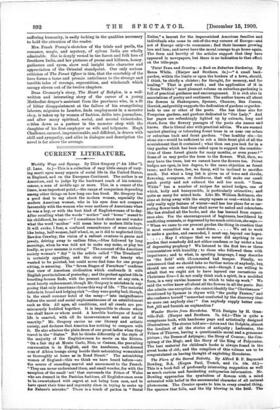'Twixt Town and Country : a Book on Suburban Gardening.
By Roma White. (Harper and Brothers. 68.)—" A. small back- garden, within the limits or upon the borders of a town, should, I think, be chiefly a cloister; for thought, for memory, and for healing." That is good Booth ; and the application of it in "Roma White's" most pleasant volume on suburban gardening is full of practical guidance and encouragement. It is rich also in associations of poetry and sentiment. The author knows all about the flowers in Shakespeare, Spenser, Chaucer, Ben Jenson, Herrick, and prettily suggests the dedication of gardens or garden- beds to one or other of the poets. She has ideas also for- Pompeian gardens, and gardens dedicated to "Oar Lady." And her pages are refreshingly lighted up by extracts, long and short, from the flowery passages of the poets she names and knows. She is liberal also with practical advice. We are warned against planting or tolerating forest trees in or near our urban, or suburban back and front gardens. "One healthy elm—let alone six—would be sufficient to rob a little front plot of all the- nourishment that it contained ; what then can you look for in a, tiny garden which has been called upon to support the constitu- tions of these forest giants for many months, or even years ? " Some of us may prefer the trees to the flowers. Well, then, we- may have the trees, but we cannot have the flowers too. Privet hedges are open, in less degree, to the same objection as forest trees ; and for these, few, we fancy, will be inclined to sacrifice much. But what a long list is given us of trees and shrubs, flowering, evergreen, or deciduous, that will make our small patch pretty and not exhaust the soil too much. " Roma White" has a number of recipes for mixed hedges, one of which, holly and honeysuckle, is particularly attractive ; and quite as many for mixed beds. Like Mr. William Robinson, she aims at doing away with the empty square or oval—which is the- only really ugly feature of winter—and has her plans for so car- peting flower-beds that they shall never be naked and coloarlese. She has studied all the books, and she has learned from experi- ence also. For the encouragement of beginners, bewildered by conflicting counsels, or depressed by too much criticism, she says :— " When we came to our present garden the thing in creation that it most resembled was a sand-dune. We set to work to make a garden, and succeeded, I must say, beyond our hopes. May I whisper that we never did anything in our- garden that somebody did not either condemn or lay under a ban of ep g prophecy ? We listened to the first two or three. ocomdmerentassintors with humility ; to those who followed them with impatience; and to what, in sporting language, I may describe as the field' with ill-concealed bad temper. Finally, we announced that we should take no further notice of anybody, but should use our own experience ; and—though I am willing to admit that we ought not to have layered our carnations on Christmas Eve—I do not really think such a spirit, in a modified form, is a very unwise humour in which to take up work." We said the writer knew all about all the flowers in all the poets. But she admits one exception : she cannot identify the " Chevisauuce mentioned by Spenser in rhyme with "the pretty Pounce," and she confesses herself "somewhat comforted by the discovery that no more can anybody else !" Can anybody supply better com- fort still and furnish an explanation ?














































 Previous page
Previous page